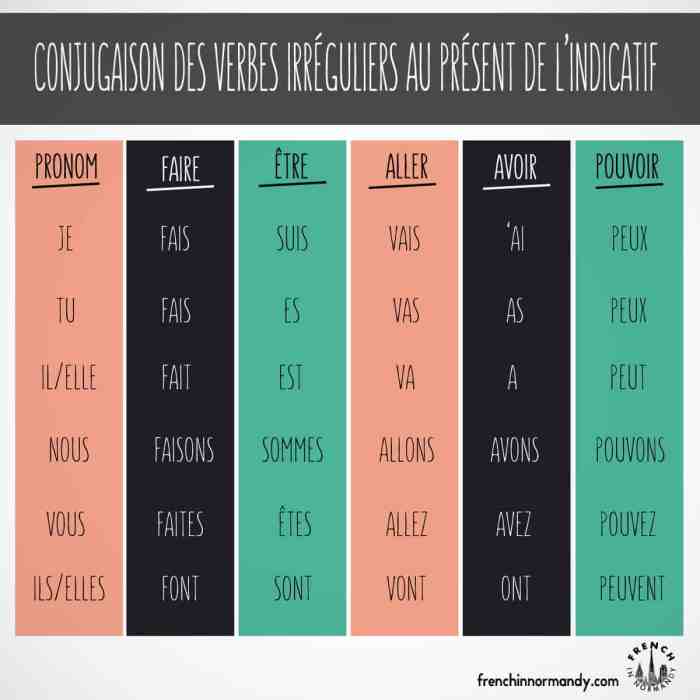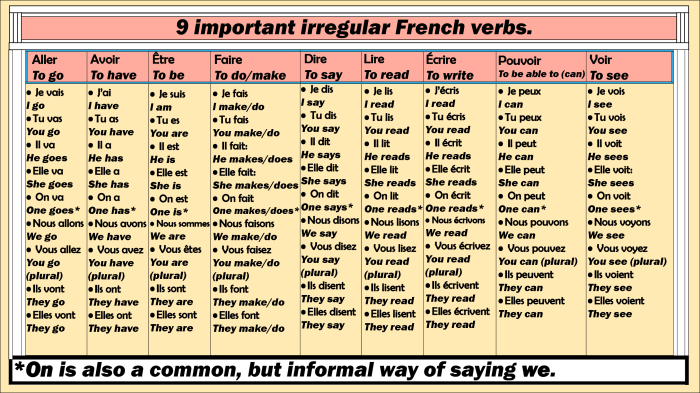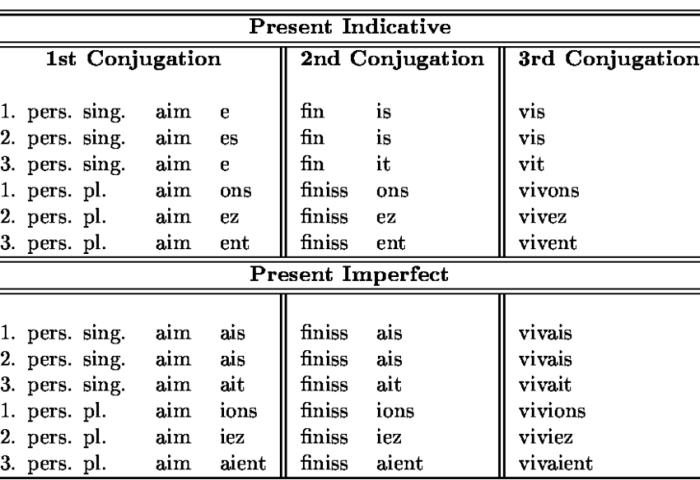Irregular -ir verbs french conjugation – Irregular -ir verb conjugation is a cornerstone of French grammar, and its mastery unlocks a world of fluent communication. This comprehensive guide delves into the intricacies of these verbs, empowering learners with the knowledge to navigate the nuances of the French language.
Through a systematic exploration of present, past, future, conditional, subjunctive, and imperative moods, this guide provides a solid foundation for understanding irregular -ir verb conjugation. With clear explanations, illustrative examples, and practical tips, learners will gain the confidence to employ these verbs accurately and effectively in various contexts.
Irregular
ir Verb Conjugation
ir Verb Conjugation

Irregular
- ir verbs are a group of French verbs that do not follow the regular conjugation patterns for
- ir verbs. They have unique conjugation patterns that must be memorized. Some common irregular
-ir verbs include
* partir (to leave)
- dormir (to sleep)
- servir (to serve)
- mentir (to lie)
- sentir (to feel)
Present Tense Conjugation
The present tense conjugation of irregular
-ir verbs follows a specific pattern. The following table Artikels the conjugation for the six subject pronouns
| Subject Pronoun | Conjugation ||—|—|| je |
s |
| tu |
s |
| il/elle/on |
t |
| nous |
ons |
| vous |
ez |
| ils/elles |
ent |
For example, the present tense conjugation of the verb partir is:* je pars
- tu pars
- il/elle/on part
- nous partons
- vous partez
- ils/elles partent
Past Tense Conjugation
The past tense of irregularir verbs can be formed using either the passé composé or the imparfait tense. The passé composé is used to express completed actions in the past, while the imparfait is used to describe ongoing or habitual actions in the past.Passé
composéThe passé composé is formed using the auxiliary verb avoir followed by the past participle of the main verb. For irregular
- ir verbs, the past participle always ends in
- i.
For example, the passé composé of the verb partir is:* j’ai parti
- tu as parti
- il/elle/on a parti
- nous avons parti
- vous avez parti
- ils/elles ont parti
ImparfaitThe imparfait is formed using the imperfect stem of the main verb followed by the appropriate subject pronoun ending. For irregular
- ir verbs, the imperfect stem is usually formed by dropping the
- ir ending and adding
- iss-.
For example, the imparfait of the verb partir is:* je partais
- tu partais
- il/elle/on partait
- nous partions
- vous partiez
- ils/elles partaient
Future Tense Conjugation, Irregular -ir verbs french conjugation
The future tense of irregular
ir verbs is formed using the auxiliary verb aller followed by the infinitive of the main verb.
For example, the future tense conjugation of the verb partir is:* je partirai
- tu partiras
- il/elle/on partira
- nous partirons
- vous partirez
– ils/elles partiront
Essential Questionnaire: Irregular -ir Verbs French Conjugation
What are irregular-ir verbs?
Irregular -ir verbs are a group of French verbs that do not follow the regular conjugation patterns for -ir verbs.
How do I conjugate irregular-ir verbs in the present tense?
To conjugate irregular -ir verbs in the present tense, you need to memorize the specific conjugation for each verb.
What is the passé composé tense?
The passé composé tense is a past tense used to describe completed actions or events.
How do I use the subjunctive mood?
The subjunctive mood is used to express wishes, doubts, or hypothetical situations.

